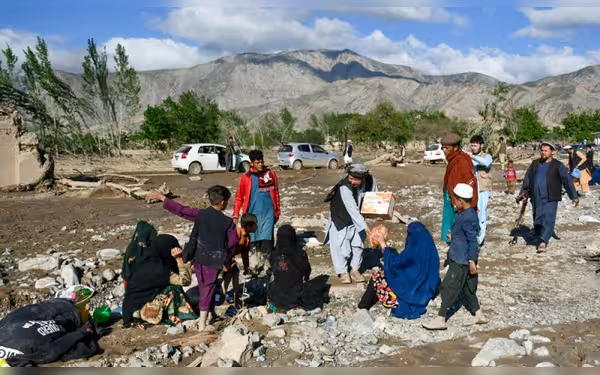Tuesday, July 2, 2024 03:28 PM
World Health Organization raises alarm over Afghanistan flood devastation
- Over 300 lives lost in catastrophic flash floods in Afghanistan
- Baghlan province hit hardest, thousands displaced and in urgent need
- Challenges in aid delivery worsen critical situation in flood-affected areas
 Image Credits: brecorder
Image Credits: brecorderAfghanistan faces a dire humanitarian crisis following catastrophic flash floods, with over 300 lives lost and thousands displaced. The World Health Organization highlights the urgent need for aid and resilience-building efforts in the country.
Recently, Afghanistan has been grappling with the aftermath of severe flash floods that have wreaked havoc in various regions, resulting in a tragic loss of over 300 lives. The World Health Organization has highlighted the dire situation in the country, particularly in Baghlan province, which has borne the brunt of the disaster.
The catastrophic floods have not only claimed numerous lives but have also left thousands of individuals displaced and in urgent need of basic necessities like food, shelter, and healthcare. Rescue operations have been hampered, and the delivery of essential aid has been severely impeded, exacerbating the already critical situation.
UN agencies and local authorities are deeply concerned about the escalating death toll, further compounded by challenges in assessing the full extent of the damage due to communication breakdowns. Reports from NGOs and the government paint a grim picture of widespread destruction, including homes, livestock, and agricultural land.
The destruction of transportation infrastructure, such as roads and bridges, has created significant barriers for aid agencies trying to reach the affected populations. The looming threat of more inclement weather in the forecast adds another layer of complexity, potentially delaying relief efforts, especially in Baghlan and other northern provinces.
Afghanistan's susceptibility to flooding, coupled with above-average rainfall following a prolonged drought, underscores the country's vulnerability to climate change. Experts have warned about the dire humanitarian consequences of such natural disasters, further exacerbating the challenges faced by the Afghan population.
The cyclical nature of disasters in Afghanistan, as emphasized by the World Food Programme, perpetuates a cycle of poverty, pushing communities deeper into hardship. With a significant reliance on agriculture for sustenance, the country's already fragile economy faces additional strain in the wake of these devastating floods.
The recent flash floods in Afghanistan have not only claimed lives but have also exposed the country's vulnerability to natural disasters and climate change. As the nation grapples with the immediate aftermath of the floods, it is crucial for international aid agencies and local authorities to work together efficiently to provide much-needed relief to the affected populations. Addressing the long-term challenges posed by such disasters requires a concerted effort to build resilience and support sustainable development in Afghanistan.













